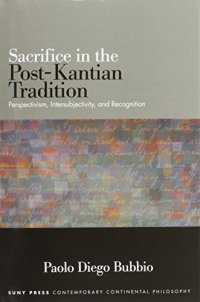
Ebook: Sacrifice in the Post-Kantian Tradition: Perspectivism, Intersubjectivity, and Recognition
Author: Paolo Diego Bubbio
- Tags: History Africa Americas Arctic Antarctica Asia Australia Oceania Europe Middle East Russia United States World Ancient Civilizations Military Historical Study Educational Resources Reference Almanacs Yearbooks Atlases Maps Careers Catalogs Directories Consumer Guides Dictionaries Thesauruses Encyclopedias Subject English as a Second Language Etiquette Foreign Genealogy Quotations Survival Emergency Preparedness Test Preparation Words Grammar Writing Research Publishing Philosophy Religious Studi
- Series: Suny Series in Contemporary Continental Philosophy
- Year: 2014
- Publisher: State Univ of New York Pr
- Language: English
- pdf
An examination of the philosophical notion of sacrifice from Kant to Nietzsche.
In this book, Paolo Diego Bubbio offers an alternative to standard philosophical accounts of the notion of sacrifice, which generally begin with the hermeneutic and postmodern traditions of the twentieth century, starting instead with the post-Kantian tradition of the nineteenth century. He restructures the historical development of the concept of sacrifice through a study of Kant, Solger, Hegel, Kierkegaard, and Nietzsche, and shows how each is indebted to Kant and has more in common with him than is generally acknowledged. Bubbio argues that although Kant sought to free philosophical thought from religious foundations, he did not thereby render the role of religious claims philosophically useless. This makes it possible to consider sacrifice as a regulative and symbolic notion, and leads to an unorthodox idea of sacrifice: not the destruction of something for the sake of something else, but rather a kenotic emptying, conceived as a withdrawal or a “making room” for others.
In this book, Paolo Diego Bubbio offers an alternative to standard philosophical accounts of the notion of sacrifice, which generally begin with the hermeneutic and postmodern traditions of the twentieth century, starting instead with the post-Kantian tradition of the nineteenth century. He restructures the historical development of the concept of sacrifice through a study of Kant, Solger, Hegel, Kierkegaard, and Nietzsche, and shows how each is indebted to Kant and has more in common with him than is generally acknowledged. Bubbio argues that although Kant sought to free philosophical thought from religious foundations, he did not thereby render the role of religious claims philosophically useless. This makes it possible to consider sacrifice as a regulative and symbolic notion, and leads to an unorthodox idea of sacrifice: not the destruction of something for the sake of something else, but rather a kenotic emptying, conceived as a withdrawal or a “making room” for others.
Download the book Sacrifice in the Post-Kantian Tradition: Perspectivism, Intersubjectivity, and Recognition for free or read online
Continue reading on any device:

Last viewed books
Related books
{related-news}
Comments (0)